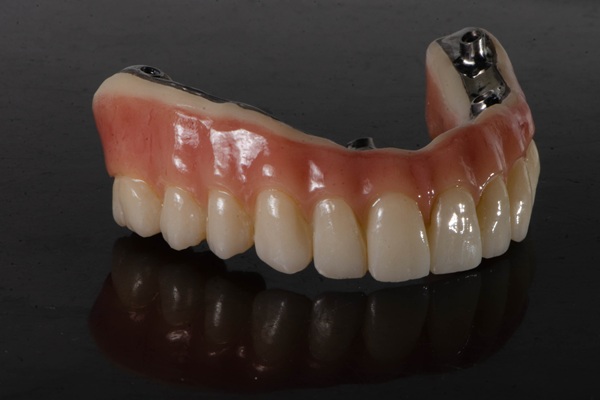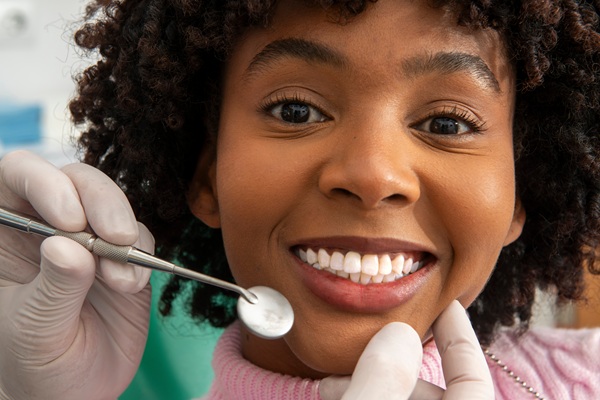What Dental Devices Are Used for Sleep Apnea?

Sleep apnea is a common, concerning, but treatable condition. Individuals who suffer from this condition may snore loudly, gasp for breath, or snort in their sleep. People with severe cases may even stop breathing at night for short periods. People with this condition often wake up feeling unrefreshed, have severe daytime fatigue, and experience regular headaches. If you believe you might be suffering from or if you have been officially diagnosed with this disorder, you may want to consult your dentist about ways to possibly alleviate your symptoms and get back to healthier sleep patterns.
3 oral appliances dentists use to treat sleep apnea
Dentists can make and apply several different devices to help relieve symptoms and mitigate concerns caused by sleep apnea. Often these devices are created to fit your specific mouth and symptoms, as different types and levels of sleep apnea require different oral appliance therapies. Here are three common types of apparatuses dentists generally use to care for patients troubled by this issue.
1. Teeth grinding guard
Grinding your teeth can be and often is a significant sign or result of sleep apnea. There is a significant correlation between unconsciously clenching the jaw and scraping top and bottom teeth together during sleep, known as sleep bruxism, and sleep disorders. The exact reason for this correlation is unknown, but using a custom-fitted mouth guard to stop the grinding and increase the space in the mouth while you sleep may help. A personalized mouthguard can decrease breathing issues from sleep apnea and allow sufferers to achieve a deeper, more relaxed sleep.
2. Mandibular advancement device
Another mouthguard or splint-like apparatus that helps treat sleep apnea is one that advances your lower jaw and tongue to create more space in your mouth and further open up your airway. Dentists often take X-rays, impressions, and perform detailed physical examinations of your mouth and throat to create these devices and mold them specifically to your needs. These devices usually consist of top and bottom guard inserts as well as a connecting henge piece. Sometimes this henge is adjustable, and other times it is fixed.
3. Tongue retaining appliance
In some cases, an oversized, unsecured tongue contributes to sleep apnea issues. In these situations, the tongue may flop back or drift to the roof of your mouth and cut off your airway causing you to wake up or pause your breathing during your sleep. Dentists can create appliances to help keep your tongue in a comfortable, safe position in your mouth while you sleep so that it does not obstruct your airway. Generally, these apparatuses gently pull or hold your tongue forward in your mouth to keep it from obstructing your nighttime breathing.
Conclusion
Sleep apnea disturbs sleep for many people. Dentists may be able to help with this sleep-disrupting condition. Oral treatment devices can be more comfortable, user-friendly, and portable than other sleep apnea treatments, but they must be created, fitted, and monitored properly. Discuss all your options and develop an appropriate, regular oral appliance maintenance schedule with your dentist. A sound night's sleep might be a single oral device away, so ask about dental sleep apnea treatments today.
Request an appointment here: https://alamedadentalaurora.com or call Alameda Dental at (303) 343-7072 for an appointment in our Aurora office.
Check out what others are saying about our dental services on Yelp: Sleep Apnea in Aurora, CO.
Recent Posts
Sleep apnea is a serious condition that causes the airway to become obstructed. Airway obstruction leads to an inability to breathe as oxygen is no longer able to flow. Additionally, sleep apnea can result in a lack of sleep, which may translate to poor work ethic, irritability, and stress. Thankfully, sleep apnea can be addressed, managed,…
Learning about your sleep apnea treatment is your next step after being diagnosed with this fairly common sleeping condition. According to Hopkins Medicine, it’s important to treat sleep apnea, because it can have long-term consequences for your health. Ready to find out more about why treating this condition is so important to your overall health?Want…
Sleep apnea and dentistry have a lot of crossover that many are surprised to hear. The oral cavity is often what causes sleep apnea, which makes a dentist an expert at detecting, diagnosing and treating this common condition. Without treatment, patients are at risk of loss of oxygen and long-term damage to the oral cavity.…
Dental sleep medicine can help with snoring and obstructive sleep apnea, which are two common sleep problems. Snoring is one of the primary symptoms of obstructive sleep apnea, but not everyone who snores has it. However, snoring alone can cause problems for individuals and their sleep partners by interrupting sleep. While the Continuous Positive Airway…


